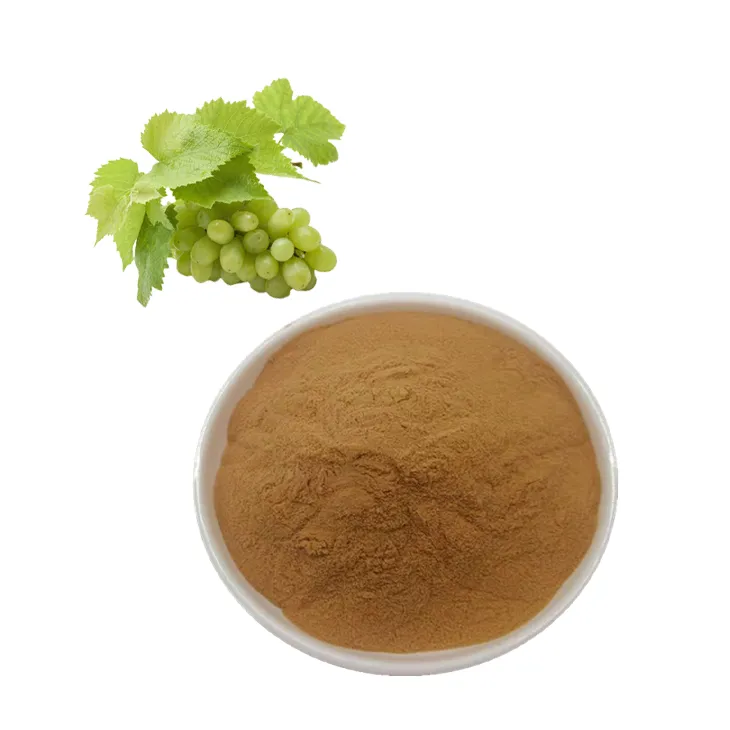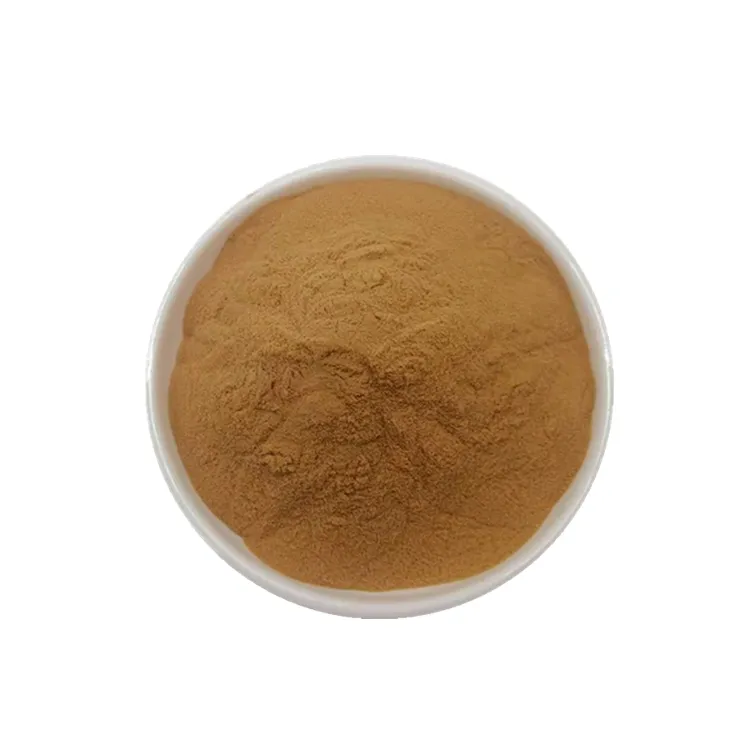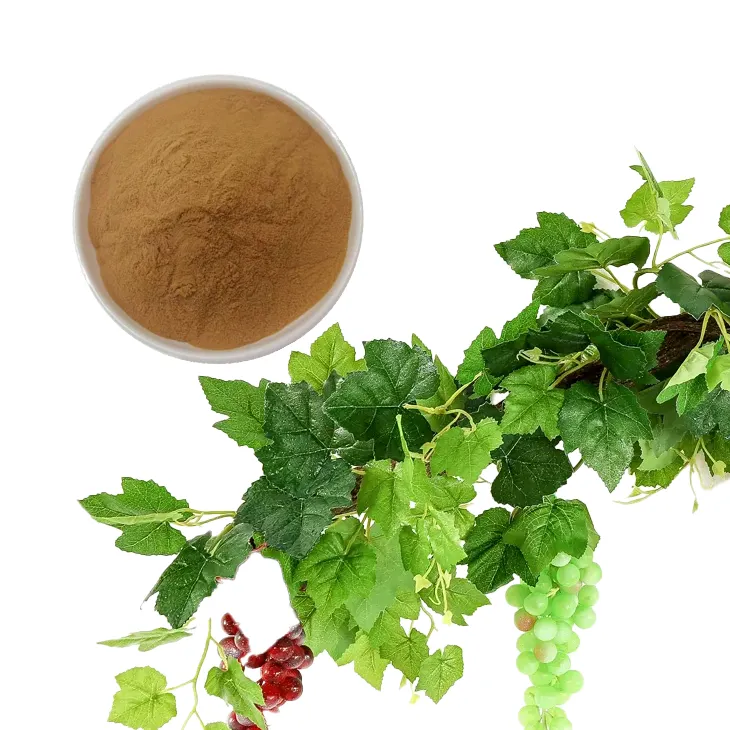- 0086-571-85302990
- sales@greenskybio.com
Powerful Grape Leaf Extract: Its Role in Athletic Performance
2024-11-13

1. Introduction
In the world of sports and athletics, the pursuit of enhanced performance is a constant goal. Athletes are always on the lookout for natural and effective ways to improve their capabilities. Grape Leaf Extract has emerged as a potential supplement with promising properties for athletic performance. This extract, derived from the leaves of the grapevine, is rich in a variety of bioactive compounds that could offer multiple benefits to athletes.

2. Composition of Grape Leaf Extract
Grape Leaf Extract contains a diverse range of substances.
2.1. Polyphenols
One of the major components is polyphenols. These are antioxidant compounds that play a crucial role in combating oxidative stress in the body. Oxidative stress can occur during intense exercise due to increased production of free radicals. Polyphenols in grape leaf extract can neutralize these free radicals, protecting cells from damage. Examples of polyphenols found in grape leaf extract include flavonoids and phenolic acids.
2.2. Minerals
Grape leaves also contain important minerals such as potassium, calcium, and magnesium. Potassium is essential for maintaining proper muscle function, including muscle contraction and relaxation. Calcium is well - known for its role in bone health and muscle contraction, while magnesium is involved in energy metabolism and muscle relaxation. These minerals can contribute to the overall physical performance of athletes.

3. Role in Increasing Energy Levels
During exercise, maintaining high energy levels is crucial for optimal performance. Grape leaf extract may play a significant role in this aspect.
3.1. Mitochondrial Function
The extract could potentially enhance mitochondrial function. Mitochondria are the powerhouses of cells, responsible for producing adenosine triphosphate (ATP), the main energy currency of the body. By improving mitochondrial function, grape leaf extract may increase the production of ATP, providing more energy for muscle contraction during exercise.
3.2. Glucose Metabolism
It may also influence glucose metabolism. Grape leaf extract could improve the way the body processes glucose, ensuring a steady supply of fuel to the muscles. This is especially important during prolonged exercise when glycogen stores in the muscles start to deplete.

4. Promotion of Better Blood Circulation
Good blood circulation is essential for athletic performance as it delivers oxygen and nutrients to the working muscles and removes waste products.
4.1. Vasodilation
Grape leaf extract has the potential to cause vasodilation, which is the widening of blood vessels. This allows for increased blood flow, ensuring that muscles receive an adequate supply of oxygen and nutrients such as glucose and amino acids. Vasodilation also helps in removing lactic acid, a by - product of anaerobic metabolism that can cause muscle fatigue.
4.2. Nitric Oxide Production
The extract may stimulate the production of nitric oxide in the body. Nitric oxide is a signaling molecule that plays a key role in regulating blood vessel dilation. By increasing nitric oxide levels, grape leaf extract can promote better blood circulation, enhancing athletic performance.
5. Anti - Inflammatory Properties
Inflammation is a common issue among athletes, especially those who engage in high - intensity training. Grape leaf extract's anti - inflammatory properties can be highly beneficial.
5.1. Reduction of Muscle Soreness
After intense exercise, athletes often experience muscle soreness, which is partly due to inflammation in the muscle tissue. The anti - inflammatory compounds in grape leaf extract can help reduce this soreness, allowing athletes to recover more quickly and resume training sooner.
5.2. Prevention of Over - Training Injuries
Chronic inflammation due to over - training can lead to various injuries. By reducing inflammation, grape leaf extract may help prevent these over - training injuries, enabling athletes to maintain a consistent training schedule.
6. Potential Applications in Different Sports
Grape leaf extract can be beneficial in a wide range of sports.
6.1. Endurance Sports
In endurance sports such as long - distance running, cycling, and triathlon, maintaining energy levels and good blood circulation are key factors for success. Grape leaf extract's ability to increase energy production and promote blood flow can give endurance athletes an edge. It can also help with post - exercise recovery, reducing muscle soreness and fatigue.
6.2. Strength and Power Sports
For sports like weightlifting, sprinting, and football, where explosive power and strength are required, grape leaf extract's role in muscle function and injury prevention is significant. By improving mitochondrial function and reducing inflammation, it can enhance muscle performance and reduce the risk of muscle - related injuries.
7. Dosage and Safety Considerations
When considering the use of grape leaf extract for athletic performance enhancement, it is important to take into account the proper dosage and safety aspects.
7.1. Recommended Dosage
Currently, there is no standardized recommended dosage for grape leaf extract specifically for athletic use. However, general guidelines suggest starting with a low dose and gradually increasing while monitoring for any adverse effects. It is also important to follow the instructions provided by the manufacturer if using a commercial grape leaf extract supplement.
7.2. Potential Side Effects
Although grape leaf extract is generally considered safe, some individuals may experience mild side effects such as gastrointestinal discomfort. Additionally, those with certain medical conditions or taking specific medications should consult a healthcare provider before using grape leaf extract, as it may interact with some drugs.
8. Conclusion
Grape leaf extract holds great potential in the realm of athletic performance. Its rich composition of bioactive compounds offers benefits in terms of increasing energy levels, promoting blood circulation, and reducing inflammation. While more research is needed to fully understand its mechanisms and establish optimal dosages, it is a promising natural supplement for athletes. Whether in endurance sports or strength - based sports, the extract may provide an additional boost to help athletes reach their performance goals. However, athletes should always approach its use with caution and under the guidance of a healthcare or sports nutrition professional.
FAQ:
1. What are the main beneficial substances in grape leaf extract?
Grape leaf extract contains various beneficial substances. It often has polyphenols, flavonoids, and other antioxidants. These components are thought to contribute to its potential effects on athletic performance, such as antioxidant protection, anti - inflammatory actions, and possible modulation of physiological functions related to exercise.
2. How does grape leaf extract increase energy levels during exercise?
It is hypothesized that the components in grape leaf extract may influence cellular metabolism. For example, some substances could enhance mitochondrial function, which is crucial for energy production in cells. This may lead to more efficient generation of adenosine triphosphate (ATP), the body's main energy currency, thus increasing energy levels during exercise.
3. Can grape leaf extract really help with muscle soreness?
Yes, it has potential in this regard. The anti - inflammatory properties of grape leaf extract are likely to play a role. Muscle soreness is often associated with inflammation in the muscles after exercise. The anti - inflammatory compounds in the extract may help reduce this inflammation, thereby alleviating muscle soreness.
4. How does grape leaf extract promote better blood circulation?
Some substances in grape leaf extract may have vasodilatory effects. This means they can relax the blood vessels, allowing for wider diameters. As a result, blood can flow more freely and efficiently, which is beneficial for delivering oxygen and nutrients to the muscles during exercise and removing waste products.
5. Is it safe for athletes to consume grape leaf extract?
Generally, when consumed in appropriate amounts, grape leaf extract is considered safe for athletes. However, as with any supplement, it is advisable to consult a healthcare professional or a sports nutritionist before starting to use it, especially if an athlete has pre - existing health conditions or is taking other medications.
Related literature
- The Role of Plant Extracts in Sports Nutrition"
- "Beneficial Effects of Grape - Derived Compounds on Exercise Performance"
- "Antioxidants from Grape Leaves and Their Impact on Athletic Health"
- ▶ Hesperidin
- ▶ citrus bioflavonoids
- ▶ plant extract
- ▶ lycopene
- ▶ Diosmin
- ▶ Grape seed extract
- ▶ Sea buckthorn Juice Powder
- ▶ Beetroot powder
- ▶ Hops Extract
- ▶ Artichoke Extract
- ▶ Reishi mushroom extract
- ▶ Astaxanthin
- ▶ Green Tea Extract
- ▶ Curcumin Extract
- ▶ Horse Chestnut Extract
- ▶ Other Problems
- ▶ Boswellia Serrata Extract
- ▶ Resveratrol Extract
- ▶ Marigold Extract
- ▶ Grape Leaf Extract
- ▶ blog3
-
Cranberry Plants and Skin - care Products.
2024-11-13
-
melatonin extract
2024-11-13
-
Ginseng Root Extract
2024-11-13
-
Buckthorn bark extract
2024-11-13
-
Curcumin Extract
2024-11-13
-
Elderberry Extract
2024-11-13
-
Kupilu Extract
2024-11-13
-
Quercetin
2024-11-13
-
Black Pepper Extract
2024-11-13
-
Motherwort Extract
2024-11-13
-
Shikone Extract
2024-11-13





















